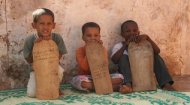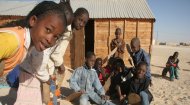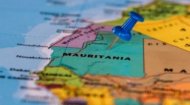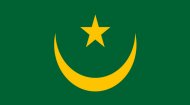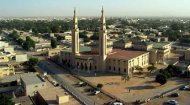|
Mauritania gained independence from France on November 28, 1960 however the post-independence era has been marked by periods of political instability, military coups, and attempts at democratic transitions. A recurring theme in its history has been the delicate balance between its Arab-Berber and Sub-Saharan African populations, alongside the deeply rooted issue of slavery, which, despite official abolition, continues to cast a long shadow over its social structure and remains a significant development challenge. The country's journey has been one of forging a national identity from diverse ethnic, linguistic, and historical threads, often against the backdrop of harsh environmental conditions and external pressures.
Islam, specifically the Maliki school of Sunni Islam, is the state religion and permeates every aspect of daily life. Mosques are central community hubs, and religious holidays are celebrated with fervour. Hospitality is a cornerstone of Mauritanian culture, with guest-welcoming rituals often involving elaborate tea ceremonies (atay) and shared meals. Oral traditions, poetry, and music play a significant role in cultural expression, with griots (storytellers) preserving ancient narratives and genealogies. Traditional dress, characterised by flowing robes (dara'a for men, malafa for women), is common, especially outside the capital. However, Mauritania's social profile faces considerable challenges. The legacy of slavery, despite successive legal abolitions, continues to manifest in deep-seated social stratification and discrimination, particularly affecting the Haratin community. Access to quality education and healthcare remains uneven, especially in remote rural areas. Gender inequality is another persistent issue, with women facing barriers in education, economic participation, and political representation, although gradual progress is being made. Rapid urbanisation strains infrastructure and resources in cities like Nouakchott, leading to informal settlements and increased demand for basic services. Moreover, human rights concerns, including freedom of expression and assembly, often draw international scrutiny. 70% of Mauritania is either desert or semi dessert and frequent droughts have forced many living nomadic lifestyles into urban areas in search of food, water and work. Unfortunately the country does not have the infrastructure required to meet these frequent influxes resulting in severe pressure, housing, sanitation and medical care. For those who continue to live outside urban areas, less that 10% have access to safe drinking water, whilst for the entire population of 5.3m (2025) it remains at just 53%. The economic profile of Mauritania is primarily reliant on its rich natural resources, though it is striving for diversification. Mining, particularly of iron ore, is the country’s leading export commodity and a significant contributor to GDP. Large deposits of iron ore are extracted from areas like Zouérat and transported by one of the world's longest trains to the port of Nouadhibou for export. Gold and copper mining also play increasingly important roles.
Despite these resources, Mauritania faces considerable economic challenges. Its reliance on primary commodities makes it vulnerable to global price fluctuations. Desertification and climate change pose existential threats to agriculture and pastoralism, exacerbating food insecurity. High rates of poverty and unemployment, particularly among the youth, are persistent issues. Infrastructure development remains inadequate outside major urban centres, hindering economic growth and access to markets. Corruption and governance issues also impede progress. The government is working with international partners to diversify the economy, improve infrastructure, and promote sustainable development, but the path forward remains complex and demanding. For most Mauritanians, daily life is profoundly shaped by the environment, cultural traditions, and the interplay of modern influences with ancient customs. In the capital of Nouakchott, a relatively young city born from a nomadic watering hole, life centres around vibrant markets like the Marché Capitale, where everything from electronics to traditional crafts and fresh produce can be found. The city's fishing port teems with activity as colourful pirogues return with their catches, offering a spectacle of sensory overload. Here, the struggle to balance rapid urbanisation with traditional ways is evident as concrete structures rise alongside makeshift encampments. Outside the major cities, particularly in the northern and central regions, life retains a more traditional, often nomadic or semi-nomadic character. Families continue to herd camels, goats, and sheep, moving their tents (khaimas) in search of pasture and water. Access to water is a constant concern, particularly in the deep desert. Traditional hospitality is paramount, and sharing tea, a ritual of three infusions, is a fundamental part of social interaction and welcomes guests. The rhythm of the day is dictated by the sun and the calls to prayer, with community and family ties providing a strong support system. |
Mauritania Profile |
Mauritania Profile |
Mauritania Profile | Mauritania Profile |

|
The challenges of daily life often include coping with extreme heat, limited access to clean water, and securing sufficient food in a land where arable land is scarce. Despite these hardships, there is a pervasive resilience and deep spiritual connection that characterises the Mauritanian people. Children attend Koranic schools alongside state schools, learning both ancient scriptures and modern curricula. Even with the advent of smartphones and satellite dishes, traditional values and a strong sense of community endure, creating a unique synthesis of old and new. While not a mainstream tourist destination, Mauritania offers a wealth of unique and tourist attractions for the adventurous traveller seeking authentic cultural experiences and unparalleled desert landscapes. Its raw, untamed beauty promises a journey off the beaten path. Foremost among its treasures are the ancient Ksour (fortified villages) of Chinguetti and Ouadane, both UNESCO World Heritage Sites. These exquisitely preserved medieval desert towns, once vital stops on the Trans-Saharan trade routes, boast captivating mud-brick architecture, ancient libraries housing priceless Islamic manuscripts, and a profound sense of stepping back in time. Exploring their narrow alleys and discovering their historic mosques is an unforgettable experience. Tichitt and Oualata, also UNESCO sites, offer similar glimpses into this rich past, albeit in even more remote locations. Along the Atlantic coast, the Banc d'Arguin National Park, another UNESCO World Heritage Site, is a spectacular haven for migratory birds and marine life. This vast coastal park, where the Sahara meets the Atlantic, is a crucial breeding ground for millions of birds, including flamingos, pelicans, and terns. It also provides a unique opportunity to witness the Imraguen people, a local fishing community, employing traditional fishing methods passed down through generations. Further inland, the Adrar Plateau presents a dramatic showcase of Saharan beauty. Here, visitors can explore breathtaking canyons, towering sand dunes, and hidden oases like Terjit, offering refreshing springs and welcome shade. The legendary Eye of the Sahara, the Richat Structure, a prominent circular feature visible from space, is a geological marvel that continues to fascinate scientists and intrepid explorers alike. While the tourism sector faces challenges related to infrastructure, marketing, and perceptions of regional security, Mauritania's unique blend of ancient history, vibrant social customs, and stunning natural wonders offers an unparalleled opportunity for cultural immersion and desert adventure, promising an enriching experience for those willing to embrace its authentic spirit. Today Mauritania is a country that has achieved a remarkable level of stability, especially compared to its volatile neighbors in the Sahel region, by effectively combating jihadist extremism and maintaining a strong security presence. However, this political stability is fragile and coexists with significant challenges, including structural issues like persistent poverty, historical tensions with its Black Mauritanian population, and the potential for increased regional instability to spill across its borders. Mauritania is in 163rd place out of 193 countries and territories in 2025 when ranked in terms of life expectancy, literacy, access to knowledge and the living standards of a country. With a life expectancy of 66.01 years (2025) and with an adult literacy rate of 67%, poverty is a major issue in Mauritania with most children just eating once a day. One mother reported proudly that one day her one year old son ate porridge one day and three days earlier was treated to couscous. Over one hundred and nine children die out of every thousand compared with just three in say a country like Spain. Locusts also plague the area, often wiping out entire harvests sending food prices rocketing.
|

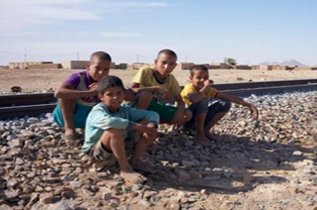 Mauritania's social profile is a mosaic of ethnic groups. The largest of these are the Maures (also known as Bidhan, or "white Moors"), who are of Arab and Berber descent, speaking the Hassaniya dialect of Arabic. Alongside them are the Haratin, ethnic Mauritanians of Sub-Saharan African descent, many of whom are descendants of formerly enslaved people. Significant Sub-Saharan African populations, including the Fula (Pulaar), Soninke, and Wolof, primarily inhabit the fertile Senegal River Valley in the south, speaking their respective languages. Arabic is the official language, but French remains widely used in administration and business, reflecting the colonial legacy.
Mauritania's social profile is a mosaic of ethnic groups. The largest of these are the Maures (also known as Bidhan, or "white Moors"), who are of Arab and Berber descent, speaking the Hassaniya dialect of Arabic. Alongside them are the Haratin, ethnic Mauritanians of Sub-Saharan African descent, many of whom are descendants of formerly enslaved people. Significant Sub-Saharan African populations, including the Fula (Pulaar), Soninke, and Wolof, primarily inhabit the fertile Senegal River Valley in the south, speaking their respective languages. Arabic is the official language, but French remains widely used in administration and business, reflecting the colonial legacy. Fishing off its extensive Atlantic coastline is another vital sector, providing livelihoods for many and contributing substantially to export earnings. The country possesses some of the richest fishing grounds in the world, though sustainable management remains a critical concern to prevent overfishing. Agriculture, largely subsistence-based, is limited by the arid climate, but date palms, millet, and maize are cultivated in oases and along the Senegal River valley. Livestock farming, particularly camel and goat herding, is crucial for nomadic and semi-nomadic populations. Recent years have seen considerable excitement surrounding the discovery of offshore oil and gas reserves, particularly the Greater Tortue Ahmeyim (GTA) project, shared with Senegal. These discoveries hold the potential to transform Mauritania's economic fortunes, promising significant revenue streams and opportunities for development.
Fishing off its extensive Atlantic coastline is another vital sector, providing livelihoods for many and contributing substantially to export earnings. The country possesses some of the richest fishing grounds in the world, though sustainable management remains a critical concern to prevent overfishing. Agriculture, largely subsistence-based, is limited by the arid climate, but date palms, millet, and maize are cultivated in oases and along the Senegal River valley. Livestock farming, particularly camel and goat herding, is crucial for nomadic and semi-nomadic populations. Recent years have seen considerable excitement surrounding the discovery of offshore oil and gas reserves, particularly the Greater Tortue Ahmeyim (GTA) project, shared with Senegal. These discoveries hold the potential to transform Mauritania's economic fortunes, promising significant revenue streams and opportunities for development.